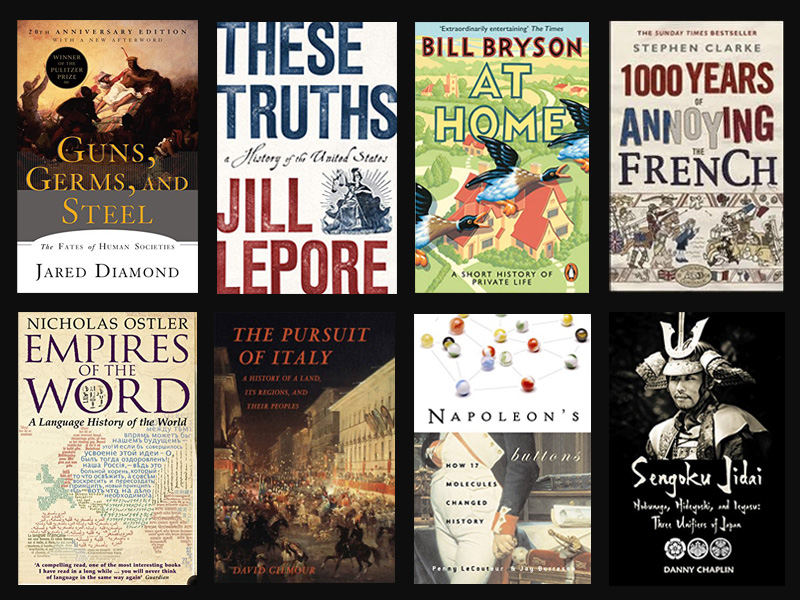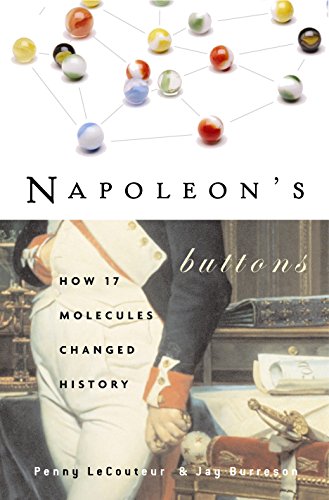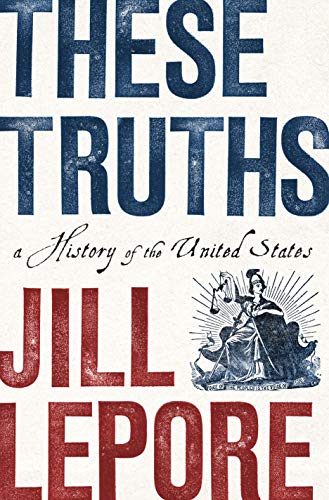I have read hundreds of history books. I already wrote a list of recommendations specifically about Roman History. Here are my other favourite books.

Global History
Guns, Germs, and Steel: The Fates of Human Societies, by Jared Diamond. A book that has become a great classic. It explains why civilisations arose the way they did in specific regions of the world, and why some civilisations became more technologically advanced than others. The book's title is a reference to the question that motivated the author to write the book: Why did a bunch of Spanish adventurers manage to conquer the Aztec and the Inca empires, which had millions of people?

Seeds of Change: Six Plants That Transformed Mankind, by Henry Hobhouse. Whereas Guns, Germs and Steel explained how local climate and the presence of domesticable plants and animals were determining factors in the rise of civilisations, Henry Hobhouse explains how sugar, tea, cotton, the potato, quinine, and the cocoa plant have shaped global history in the last few centuries.

Napoleon's Buttons: How 17 Molecules Changed History, by Penny Le Couteur and Jay Burreson. Napoleon's buttons is a very similar kind of book to Seeds of Change, combining chemistry and history. This book also includes the basics of organic chemistry for non scientists, so that the reader can appreciate how similar some molecules from different plants really are. The 17 molecules discussed in the book our eyes are natural, like piperine from pepper or isoeugenol from nutmeg, or completely manmade like the birth control pill or CFCs from early refrigerators. A great book, easy to read, well researched and entertaining.

A Short History of Nearly Everything, by Bill Bryson. The author's quest to understand everything that has happened from the Big Bang to the rise of civilization - how we got from there, being nothing at all, to here, being us. It is the biggest-selling popular science book of the 21st century and has sold over 2 million copies.

At Home: A short history of private life, by Bill Bryson. A history of home from architecture to electricity, from food preservation to epidemics, from the spice trade to the Eiffel Tower, from crinolines to toilets; and on the brilliant, creative and often eccentric minds behind them.

Larry Gonick's Cartoon History series might sound like something for children, but it's not. Suitable for teenagers and adults alike, the books are well-written, hilarious and thoroughly enjoyable. There are five books in the series:





East Asian History
Sengoku Jidai. Nobunaga, Hideyoshi, and Ieyasu: Three Unifiers of Japan, by Danny Chaplin. Perhaps the best book in English about this fascinating and eventful period of Japanese history.

Wild Swans: Three Daughters of China, by Jung Chang. Through the story of three generations of women in her own family – the grandmother given to the warlord as a concubine, the Communist mother and the daughter herself – Jung Chang reveals the epic history of China's twentieth century. The book has sold more than 13 million copies.

European History
Ancestral Journeys: The Peopling of Europe from the First Venturers to the Vikings, by Jean Manco is the best book I know of about historical population genetics and archeogenetics. It is the main reason I did not write a book of my own, as it would have been very similar to Jean's book, except that her writing style is superior to mine. The structure of the book is chronological and she introduces the main relevant concepts in the first two chapters, clearly and eloquently explaining how DNA can be used to retrace ancestry, or how archaeology and linguistics often can and should be combined with genomics to make sense of human prehistory and ancient migrations. She rightfully warns of the dangers of not confusing pots for people - although in the first version of the book she ironically falls in that trap with the Bell Beakers, assuming that there were one homogeneous ethnic group (which I was told was corrected in this second edition). Overall the book is very well structured, well researched, clear and coherent. It is an informative and comprehensive introduction to European population history that I think everyone on this forum should read. It's a great complement to my articles, which often require a basic knowledge of prehistory and population genetics to be understood, which this book aptly provides.

Expedition to Disaster: The Athenian Mission to Sicily 415 BC, by Philip Matyszak. Tale of the ill-fated Athenian expedition to conquer Sicily in the midst of the Peloponnesian War against Sparta.

The Rise of the Hellenistic Kingdoms 336–250 BC, by Philip Matyszak. Upon Alexander the Great’s death, his empire rapidly broke into several successor states. This narrative covers the remarkable contribution of the Eastern Greeks in fields such as philosophy, science and culture, the main focus is on the rivalry, politics and wars, both civil and foreign, which the Hellenistic rulers constantly fought among themselves.

1000 Years Of Annoying The French, by Stephen Clarke. It is a well researched and very entertaining summary of Anglo-French relations since the time of William the Conqueror.

The French Revolution and What Went Wrong, by Stephen Clarke. A great account of the French Revolution, written in a light, humorous and witty style.

The Discovery of France: A Historical Geography, by Graham Robb. A mesmerising look into the hidden history of France, with unsuspected ancient tribal divisions, prehistoric communication networks, and pre-Christian beliefs. Graham Robb recounts the epic journeys of mapmakers, scientists, soldiers, administrators, and intrepid tourists, of itinerant workers, pilgrims, and herdsmen with their millions of migratory domestic animals. We learn how France was explored, charted, and colonized, and how the imperial influence of Paris was gradually extended throughout a kingdom of isolated towns and villages.

The Pursuit of Italy: A History of a Land, Its Regions, and Their Peoples, by David Gilmour. Widely acclaimed as the best single-volume history of Italy to date, it is one of the most vivid and elegantly written history books I have read. Note that half of the book is about modern Italy since the unification in the 1860's.

The New Spaniards, by John Hooper is a very insightful look into recent Spanish history. There is no better account to understand how Spanish society and politics evolved in the 20th century.

American History
These Truths: A History of the United States, by Jill Lepore. It has been acclaimed as one of the best single volume (960 pages) history of the USA.

History of Languages
Empires of the Word: A Language History of the World, by by Nicholas Ostler. Have you ever wondered why Latin never really took hold in the Eastern part of the Roman empire or in North Africa, but Arabic managed to replace local languages in the Levant, Mesopotamia and North Africa in just a few generations? If so, this book is for you.

The Stories of English, by David Crystal.

The Story of English, by Robert McCrum, Robert MacNeil & William Cran.

Made In America: An Informal History of American English, by Bill Bryson. Bryson tells the story of how American arose out of the English language, and along the way, de-mythologizes his native land - explaining how a dusty desert hamlet with neither woods nor holly became Hollywood, how the Wild West wasn’t won, why Americans say ‘lootenant’ and ‘Toosday’, how they were eating junk food long before the word itself was cooked up - as well as exposing the true origins of the words G-string, blockbuster, poker and snafu.


Global History
Guns, Germs, and Steel: The Fates of Human Societies, by Jared Diamond. A book that has become a great classic. It explains why civilisations arose the way they did in specific regions of the world, and why some civilisations became more technologically advanced than others. The book's title is a reference to the question that motivated the author to write the book: Why did a bunch of Spanish adventurers manage to conquer the Aztec and the Inca empires, which had millions of people?

Seeds of Change: Six Plants That Transformed Mankind, by Henry Hobhouse. Whereas Guns, Germs and Steel explained how local climate and the presence of domesticable plants and animals were determining factors in the rise of civilisations, Henry Hobhouse explains how sugar, tea, cotton, the potato, quinine, and the cocoa plant have shaped global history in the last few centuries.

Napoleon's Buttons: How 17 Molecules Changed History, by Penny Le Couteur and Jay Burreson. Napoleon's buttons is a very similar kind of book to Seeds of Change, combining chemistry and history. This book also includes the basics of organic chemistry for non scientists, so that the reader can appreciate how similar some molecules from different plants really are. The 17 molecules discussed in the book our eyes are natural, like piperine from pepper or isoeugenol from nutmeg, or completely manmade like the birth control pill or CFCs from early refrigerators. A great book, easy to read, well researched and entertaining.

A Short History of Nearly Everything, by Bill Bryson. The author's quest to understand everything that has happened from the Big Bang to the rise of civilization - how we got from there, being nothing at all, to here, being us. It is the biggest-selling popular science book of the 21st century and has sold over 2 million copies.

At Home: A short history of private life, by Bill Bryson. A history of home from architecture to electricity, from food preservation to epidemics, from the spice trade to the Eiffel Tower, from crinolines to toilets; and on the brilliant, creative and often eccentric minds behind them.

Larry Gonick's Cartoon History series might sound like something for children, but it's not. Suitable for teenagers and adults alike, the books are well-written, hilarious and thoroughly enjoyable. There are five books in the series:
- Cartoon History of the Universe I: From the Big Bang to Alexander the Great
- The Cartoon History of the Universe II: From the Springtime of China to the Fall of Rome
- The Cartoon History of the Universe III: From the Rise of Arabia to the Renaissance
- The Cartoon History of the Modern World Part 1: From Columbus to the U.S. Constitution
- The Cartoon History of the Modern World, Part 2: From the Bastille to Baghdad


East Asian History
Sengoku Jidai. Nobunaga, Hideyoshi, and Ieyasu: Three Unifiers of Japan, by Danny Chaplin. Perhaps the best book in English about this fascinating and eventful period of Japanese history.

Wild Swans: Three Daughters of China, by Jung Chang. Through the story of three generations of women in her own family – the grandmother given to the warlord as a concubine, the Communist mother and the daughter herself – Jung Chang reveals the epic history of China's twentieth century. The book has sold more than 13 million copies.

European History
Ancestral Journeys: The Peopling of Europe from the First Venturers to the Vikings, by Jean Manco is the best book I know of about historical population genetics and archeogenetics. It is the main reason I did not write a book of my own, as it would have been very similar to Jean's book, except that her writing style is superior to mine. The structure of the book is chronological and she introduces the main relevant concepts in the first two chapters, clearly and eloquently explaining how DNA can be used to retrace ancestry, or how archaeology and linguistics often can and should be combined with genomics to make sense of human prehistory and ancient migrations. She rightfully warns of the dangers of not confusing pots for people - although in the first version of the book she ironically falls in that trap with the Bell Beakers, assuming that there were one homogeneous ethnic group (which I was told was corrected in this second edition). Overall the book is very well structured, well researched, clear and coherent. It is an informative and comprehensive introduction to European population history that I think everyone on this forum should read. It's a great complement to my articles, which often require a basic knowledge of prehistory and population genetics to be understood, which this book aptly provides.

Expedition to Disaster: The Athenian Mission to Sicily 415 BC, by Philip Matyszak. Tale of the ill-fated Athenian expedition to conquer Sicily in the midst of the Peloponnesian War against Sparta.

The Rise of the Hellenistic Kingdoms 336–250 BC, by Philip Matyszak. Upon Alexander the Great’s death, his empire rapidly broke into several successor states. This narrative covers the remarkable contribution of the Eastern Greeks in fields such as philosophy, science and culture, the main focus is on the rivalry, politics and wars, both civil and foreign, which the Hellenistic rulers constantly fought among themselves.

1000 Years Of Annoying The French, by Stephen Clarke. It is a well researched and very entertaining summary of Anglo-French relations since the time of William the Conqueror.
The French Revolution and What Went Wrong, by Stephen Clarke. A great account of the French Revolution, written in a light, humorous and witty style.

The Discovery of France: A Historical Geography, by Graham Robb. A mesmerising look into the hidden history of France, with unsuspected ancient tribal divisions, prehistoric communication networks, and pre-Christian beliefs. Graham Robb recounts the epic journeys of mapmakers, scientists, soldiers, administrators, and intrepid tourists, of itinerant workers, pilgrims, and herdsmen with their millions of migratory domestic animals. We learn how France was explored, charted, and colonized, and how the imperial influence of Paris was gradually extended throughout a kingdom of isolated towns and villages.

The Pursuit of Italy: A History of a Land, Its Regions, and Their Peoples, by David Gilmour. Widely acclaimed as the best single-volume history of Italy to date, it is one of the most vivid and elegantly written history books I have read. Note that half of the book is about modern Italy since the unification in the 1860's.

The New Spaniards, by John Hooper is a very insightful look into recent Spanish history. There is no better account to understand how Spanish society and politics evolved in the 20th century.

American History
These Truths: A History of the United States, by Jill Lepore. It has been acclaimed as one of the best single volume (960 pages) history of the USA.

History of Languages
Empires of the Word: A Language History of the World, by by Nicholas Ostler. Have you ever wondered why Latin never really took hold in the Eastern part of the Roman empire or in North Africa, but Arabic managed to replace local languages in the Levant, Mesopotamia and North Africa in just a few generations? If so, this book is for you.

The Stories of English, by David Crystal.

The Story of English, by Robert McCrum, Robert MacNeil & William Cran.
Made In America: An Informal History of American English, by Bill Bryson. Bryson tells the story of how American arose out of the English language, and along the way, de-mythologizes his native land - explaining how a dusty desert hamlet with neither woods nor holly became Hollywood, how the Wild West wasn’t won, why Americans say ‘lootenant’ and ‘Toosday’, how they were eating junk food long before the word itself was cooked up - as well as exposing the true origins of the words G-string, blockbuster, poker and snafu.

Last edited:

